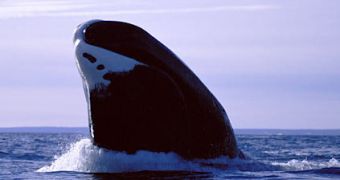A study conducted in the eastern waters of Greenland by a researcher from the University of Washington shows that the endangered bowhead whale population here might have made a much-expected recovery.
Thus, oceanographer Kate Stafford found that, during five wintertime months she spent closely monitoring these waters, continuous and incredibly varied whale songs could be heard in the deep.
Stunned by this discovery, she tells us that, “We hoped to record a few little grunts and moans. We were not expecting to get five months of straight singing.”
Seeing how Kate Stafford and her team successfully recorded and identified as much as 60 unique songs performed by these marine mammals, the case is now made that these recordings may very well point towards the fact that this endangered species is steadily beginning to make a comeback.
As reported on the University of Washington's official website, the oceanographer enthusiastically commented on her findings as follows: “If this is a breeding ground, it would be spectacular.”
She went on to explain that, “For such a critically endangered species, it’s really important to know that there’s a reproductively active portion of the population.”
However, she also wanted to draw attention to the fact that, if its indeed true that bowhead whales are successfully breeding in this part of the world, it is compulsory to try and preserve the marine ecosystems in this region by fighting back the decline in Arctic sea ice.
For those unaware, what makes bowhead whales so very special is that they typically grow to be as much as 60 feet long (18.2 meters) and weigh an impressive 200,000 pounds (approximately 90 tons).
Moreover, their skulls can break through ice sheets whose thickness revolves around 1.5 feet (roughly 0.5 meters). Not to mention the fact that they can live to be 200 years old.
As far as we are concerned, if it is indeed true that the whale songs Kate Stafford recorded stand as proof that this species is thriving in these waters, then conservation projects need be implemented as soon as possible in this part of the world.

 14 DAY TRIAL //
14 DAY TRIAL //